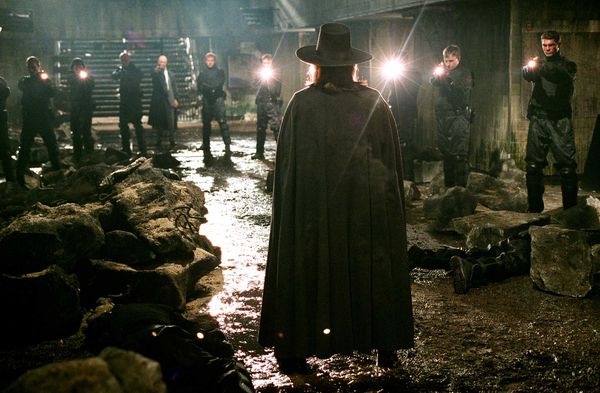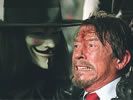Eye For Film >> Movies >> V For Vendetta (2005) Film Review

V For Vendetta is a film that catches you entirely off guard.
It is directed by James McTeigue, who had previously been assistant director on the Matrix trilogy and Star Wars: Episode II - Attack Of The Clones. Its screenplay is written by the Wachowski Brothers (of The Matrix fame), based on a graphic novel by Alan Moore and David Lloyd. Its producer, Joel Silver, is the man behind the Lethal Weapon and Matrix franchises, as well as Die Hard and Predator and large explosions form an essential part of its plot premise. Yet far from the adrenaline-pumped wire-fu and CGI extravaganza that might be expected from such constituent elements, V For Vendetta is for the most part a surprisingly low key mystery thriller and character drama, albeit with the occasional pyrotechnic set-piece, whose real powder keg is less in its punch than in its politics.

In the near future, after a period of war, chaos and disease, something like stability has at last come to England, but at a high price. For the nation has become a fascist regime, ruled over by the fear-mongering Chancellor Sutler (John Hurt) and his right hand man Creedy (Tim Pigott-Smith), who heads the State's dreaded secret police. Caught in the street by two of Creedy's vicious Fingermen after curfew, Evey Hammond (Natalie Portman) is rescued by a man in a grinning Guy Fawkes mask, who introduces himself only as V (Hugo Weaving). As the midnight bells chime in the fifth of November, Evey watches as V detonates explosives placed beneath the Old Bailey, and then, via an unauthorised nationwide broadcast, invites all like-minded members of the populace to stand with him outside the Houses of Parliament the following year for a revolutionary Guy Fawkes Day they will never forget.
Assigned to track down the mysterious "terrorist", Chief Inspector Finch (Stephen Rea) investigates a series of bizarre revenge crimes, perpetrated by V, that lead to uncomfortable questions about the circumstances of Sutler's rise to power. Evey, too, is struggling to work out whether V is a homicidal brute, a vindictive victim, an anarchic champion of liberty, the man of her dreams, or just plain mad. Yet, with the fifth of November fast approaching, the time has come where everyone must decide where they stand.
Not only is the hero of the film a murderer, a terrorist and a gleeful destroyer of large public buildings, but his actions, though always questioned, are also justified, and, yes, even glorified, in a move that slyly confounds the prevailing ideology of the current War on Terror. V is all manner of things: the Man in the Iron Mask, the Phantom of the Opera, Zorro and Robin Hood; a dandy, an aesthete, a showman and an outlaw; an intellectual swordsman with a razor-sharp wit to match his collection of throwing blades; an archivist of the past and a dreamer of the future; a calculating tactician and a cunning improviser; a mortal, a monster, a ghost and an irrepressible idea. Most of all, though, he is complex - too complex, indeed, to be reduced to a simple label like "terrorist" - so that, with this character, and in this context, it becomes possible to imagine that blowing up the mother of all Parliaments and the cradle of Western democracy need not always be a bad thing, and might even be commendable. It is difficult to think of a more explosively subversive message, especially in the political aftermath of 9/11.
Nor does it stop there. For the totalitarian dystopia depicted in the film is not some cyberpunk never-never-land, but a place with features all too recognisable (however exaggerated) to anyone living in today's world. It is a place where words like "collateral" and "rendition" have become terrifying, where the state has powers to detain indefinitely those it perceives as its enemies, and where the politics of fear predominate. Moore and Lloyd were originally inspired to write their comic series by Margaret Thatcher's Britain in the Eighties; but the Wachowski brothers' screenplay adaptation has been brought right up to date, even including mock-up news reports on avian flu, water shortages, war and terror, all of which could have been taken directly from this month's British television.
In an extraordinary piece of physical and vocal acting, Weaving keeps V mercurial, sympathetic and believable without ever removing his fixed mask, or revealing his face. It is also strange, but definitely effective, to see Hurt playing Big Brother only 22 years after he was Winston Smith in Michael Radford's 1984 and Rea is excellent as the lugubrious Finch, trying to do a good job in impossible circumstances.
The only weak point in the film is Portman, who has always been at her best in more intimate productions, like Beautiful Girls, Garden State and Closer, and who never really seems at home in the part of Evey. To be fair, much of the problem with her characterisation appears to be more a fault of the script than of the actor, for Evey's story arc is handled too impressionistically to be plausible, as though this figure, necessary to guide us through V's underground world and to give him someone to talk to, has been given the qualities of a living, breathing person only sketchily and as an afterthought. There can certainly be no question of her commitment to the role, for, like Demi Moore in GI Jane, she allows her hair to be shaved off in real time on-screen. However, this is still not quite enough to remove the suspicion that her character is little more than a plot function.
In making V a symbol of vengeance, valiance and victory, V For Vendetta does for a letter of the alphabet what Kill Bill did for the colour yellow. It is a film that thrills and mystifies, blending modern-day politics with good old-fashioned derring-do to explore the grey areas (in a very grey-looking London) between freedom, justice, dissidence and retribution.
Most of all, it turns the viewer, at least momentarily, into a rebel against the state. That it has been granted a cinematic release at all is a considerable measure of how freely we do, in fact, live.
Reviewed on: 17 Mar 2006




















